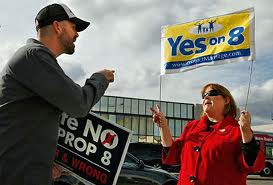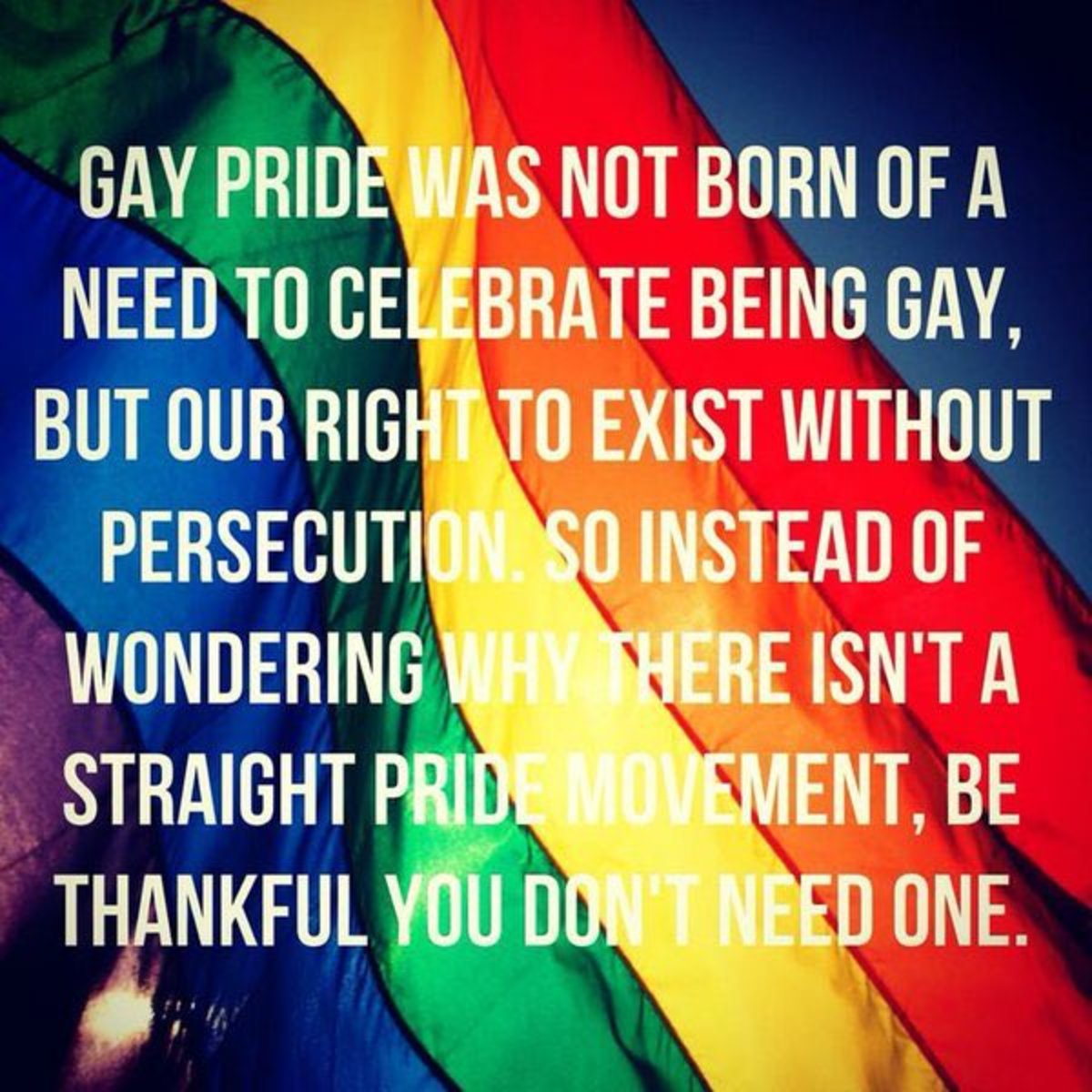Gay Marriage: Why It's Fine With Me
Which best describes your opinion regarding gay marriage?

Gay Marriage: Why It's Fine With Me
In recent years, gay marriage has been one of the most contentious and emotionally charged issues in the United States. Just yesterday, a federal court struck down Proposition 8, California’s ban on gay marriage. The legal battles, however, have only just begun.
I had some reservations about addressing this issue because I know that many people will have a problem with my point of view. It is this controversy, however, that makes the issue irresistible. So I have compiled, in no particular order, what I believe to be a comprehensive list of the arguments against gay marriage, with each argument followed by an attempt to refute it.
1) If gay marriage is made legal, it will open the door for other types of non-traditional marriage. People might want to marry their pets and farm animals, and polygamy could potentially make a comeback. First of all, the argument that people will marry animals is stupid, and it embarrasses the people who make it. As far as I know, no one has learned to speak dog, cat, or horse language. (Although we can train them to obey simple commands.) Marriage, by definition, is a contract involving two consenting adults. So if we can’t speak animal language, it is difficult to determine if the animal has given consent. And because it is a bitch to pick up a pen with a paw or a hoof, it is impractical to get written consent from them either. Even if we could understand their wishes, I’m not sure if animals quite get the concept of marriage. I suspect that we will never know. Now the polygamy argument is more plausible. Polygamy has been common throughout history and still exists sort of underground in the United States. Personally, I don’t have a big problem with polygamy. I would not recommend entering into this type of arrangement, but if other people make this choice, it has no negative effect on me. At least it is honest. Large numbers of Americans have multiple romantic relationships simultaneously, and in most cases this is done secretly. It’s difficult to argue that polygamy is somehow more immoral than adultery. Now allowing polygamy could raise some tricky questions involving child custody, tax breaks, medical insurance, inheritance, and many other issues, but these questions can be tricky now with our heterosexual monogamy system. Adapting the rules to polygamous marriage might force us to ask ourselves if the current rules and regulations surrounding marriage make any sense. (In particular, it could be another reason to change a medical system in which it is so difficult for many to get affordable insurance.)
2) If gay marriage becomes legal, it will be the strongest sign yet that homosexual behavior, something many Americans disapprove of, has become acceptable. People who disapprove of homosexuality should not be forced to accept it as normal. I kind of agree with this argument. The acceptance of gay marriage would represent a major cultural shift in our country. The only question, I guess, is whether or not you think that this is a positive thing. No one, however, is going to be forced into thinking that homosexuality is OK. There are lots of perfectly legal behaviors that people have the right to openly criticize: heavy drinking, extramarital sex, gambling, and the list goes on and on. You do not, however, have the right to abuse or discriminate against people who have a lifestyle you do not like. You will also run into trouble if you try to turn your personal code of ethics into a legal code. It is impossible to legally ban all of the things that you are personally against. If the ten commandments were ever turned into a legal code, all of us would be fined or in jail – or in the Old Testament, stoned – fairly quickly, and the lawmakers would be put away first. Can you imagine if adultery was illegal? What if you could arrest or sue someone for coveting your wife, dishonoring his or her parents, or doing some work on the Sabbath day. The only commandments that can be practically enforced are those against killing or stealing, and I think we can all agree that physically harming someone or stealing his or her stuff is more damaging than performing a gay marriage in front of that person. We are all forced to put up with some behaviors that we find offensive. The basic rule in our country is that people have the right to engage in behaviors that do not infringe on the rights of others. Try as I might, I cannot think of any way that other people entering into a gay marriage takes away my rights. The Constitution, as far as I know, does not say that we have the right to never be offended. Interracial marriage used to offend people and was illegal in many states until shortly after the Civil Rights Movement. Forty years ago, my marriage would have therefore been illegal in certain parts of the country. Heaven forbid that people as dangerous as my wife and I should offend anyone!
3) If gay marriage becomes legal, schools will be forced to teach children that it is OK. This is a classic scare tactic, like Sarah Palin and death panels. I went to school for many years, and I never remember anyone teaching me lessons about proper marriages. Schools may at some point tell kids that gay marriage exists and is legal when or if these become reality. Schools may also promote tolerance, which of course refers to treating all people regardless of race, religion, color, or sexual persuasion with some basic respect. Does this mean that schools are teaching that gay marriage and homosexuality in general are morally acceptable? Not necessarily. They are just pointing out that it exists and that you should not be mean to gay people. How could anyone have a problem with that? I doubt that there are many kids who get their morals from schools anyway.
4) If gay marriage becomes legal, it will be easier for homosexual couples to adopt and raise children. (Or to have kids through surrogates, artificial insemination, etc.) If kids are raised by gay parents, it will do them (the kids) psychological harm. I am unaware of any hard evidence that proves that children raised by gay couples are psychologically damaged. If they are, the damage probably comes from individuals who criticize or make fun of their parents, not from the parents themselves. In this case, it is society that has the problem. Yet, if you could somehow show that it is bad for children to be raised by anyone other than a married man or woman, gay parents are hardly your biggest problem. Huge numbers of children are being raised by parents that are living in equally “immoral” circumstances. Divorced parents, single parents living with significant others, and gay, unmarried parents are all undesirable parents according to many who are against gay marriage. Should we take actions to prevent these parents from “damaging” their kids?
5) Gay marriage threatens America’s traditional, Judeo-Christian concept of marriage. It will degrade the institution of marriage for everyone.
6) If gay marriage becomes acceptable, churches and religious organizations will be forced to give the sacrament of marriage to people engaged in a relationship that goes against their faith.
7) Gay marriage is unnecessary. Most (if not all) states have other types of legal contracts that can provide gay couples with all of the benefits that married couples receive.
I am going to deal with arguments 5-7 together. They all come down to the same central issue. Often, when people argue against gay marriage, they are using the term marriage differently than the state does. For many, marriage is primarily a sacrament, a sacred union blessed by God and performed by some sort of a religious minister. In a country where you can get married by a judge or by an Elvis impersonator in Vegas, it does not take long to figure out that the United States does not view marriage as a religious sacrament. According to the state, marriage is a legal contract that has implications for child care, property sharing, medical insurance, hospital visitation rights, and many other issues. People who say that they are fine with “civil unions” but offended by “gay marriage” do not seem to understand that they are essentially the same thing according to the state. Churches and religious institutions, therefore, are not required to perform a marriage ceremony for anyone. I know from personal experience that the Catholic Church has a policy against marrying two non-Catholics or of marrying someone who has been divorced. (They require that the divorced participant(s) get an annulment.) As far as I know, no one is suing the Catholic Church for these policies. If the church refuses to perform the ceremony, this will do nothing to stop the individuals from marrying. So when people worry about the marriage institution being somehow degraded, their fears are misguided. In a sense, the institution is already degraded. Lots of heterosexual couples have married without seeking any blessing from God. Las Vegas, in particular, degrades the institution every day. Should we ban the Vegas style fifteen-minute wedding?
The most important question that I ask myself is why this issue gets so much attention. For me, this issue has always seemed to be a smokescreen, a distraction from the issues that actually impact people’s lives: health care, business regulations, entitlement reform, defense spending, etc. The problem with the issues that really matter is that they are complicated, and they often force people to think about details that require a great deal of time, patience, and a large attention span. Gay marriage seems simple. You are either for it or against it. It also appeals, particularly for its opponents, to emotional, gut-level feelings of right and wrong. Politicians may be many things, but they are not dumb. They recognize an opportunity to emotionally manipulate voters when they see it, and there is no emotion easier to manipulate than fear, the most important emotion in politics. When you go through the arguments against gay marriage, many are rooted in a gut-level fear of change.
To many opponents of gay marriage, this issue represents a major front in the culture war, a somewhat mythical battle between people who uphold conservative, “family values” and secular liberals pushing, among other things, the “gay agenda.” They seem to think that if they elect politicians who believe in these family values then America itself will have better values. I don’t know about you, but I don’t get my values from politicians. Anyone who puts their hope for family values into the hands of politicians is bound to be disappointed. Whenever you hear about a sex scandal involving a politician, more often than not it is the story of a “family values” conservative who apparently went astray. I don’t care about politicians’ self-proclaimed values; I care about their positions on the issues that actually affect me. If people want the values of Americans to improve, and if they want to protect marriage, they should focus on improving their own marriages and on living up to the values that they claim to believe. Maybe then they will have less time and energy to spend butting in on other people’s personal lives.









